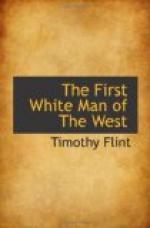It must he confessed, that they had many motives to this persevering and deadly hostility, apart from their natural propensity to war. They saw this new and hated race of pale faces gradually getting possession of their hunting grounds, and cutting down their forests. They reasoned forcibly and justly, that the time, when to oppose these new intruders with success, was to do it before they had become numerous and strong in diffused population and resources. Had they possessed the skill of corporate union, combining individual effort with a general concert of attack, and directed their united force against each settlement in succession, there is little doubt, that at this time they might have extirpated the new inhabitants from Kentucky, and have restored it to the empire of the wild beasts and the red men. But in the order of events it was otherwise arranged. They massacred, they burnt, and plundered, and destroyed. They killed cattle, and carried off the horses;—inflicting terror, poverty, and every species of distress; but were not able to make themselves absolute masters of a single station.
It has been found by experiment, that the settlers in such predicaments of danger and apprehension, act under a most spirit-stirring excitement, which, notwithstanding its alarms, is not without its pleasures. They acquired fortitude, dexterity, and that kind of courage which results from becoming familiar with exposure.
The settlements becoming extended, the Indians, in their turn, were obliged to put themselves on the defensive. They cowered in the distant woods for concealment, or resorted to them for hunting. In these intervals, the settlers, who had acquired a kind of instinctive intuition to know when their foe was near them, or had retired to remoter forests, went forth to plough their corn, gather in their harvests, collect their cattle, and pursue their agricultural operations. These were their holyday seasons for hunting, during which they often exchanged shots with their foe. The night, as being most secure from Indian attack, was the common season selected for journeying from garrison to garrison.
We, who live in the midst of scenes of abundance and tranquillity can hardly imagine how a country could fill with inhabitants, under so many circumstances of terror, in addition to all the hardships incident to the commencement of new establishments in the wilderness; such as want of society, want of all the regular modes of supply, in regard to the articles most indispensable in every stage of the civilized condition. There were no mills, no stores, no regular supplies of clothing, salt, sugar, and the luxuries of tea and coffee. But all these dangers and difficulties notwithstanding, under the influence of an inexplicable propensity, families in the old settlements used to comfort and abundance, were constantly arriving to encounter all these dangers and privations. They began to spread over the extensive and fertile country in every direction—presenting such numerous and dispersed marks to Indian hostility, red men became perplexed, amidst so many conflicting temptations to vengeance, which to select.




